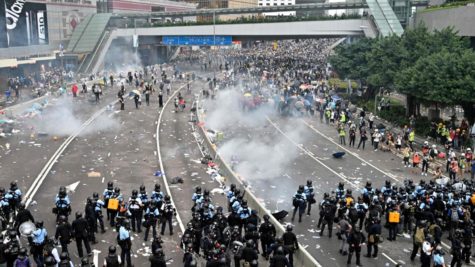Will the Protests in Hong Kong ever be resolved?
October 18, 2019
In June, the first protests erupted in Hong Kong against a proposed bill from the leaders of the city. The bill, which is being dubbed the “extradition bill”, would create an extradition agreement between Hong Kong, China, and Taiwan, and would allow criminal suspects from Hong Kong and Taiwan to face trial in Chinese courts. The reaction from the Hong Konger’s is that this could lead to unfair trials and lack of representation, along with violent treatment from the single-party government of China. The bill would therefore be a greater power, and the Chinese government would have control over Hong Kong. To understand the whole situation, there needs to be some background context on the history of how Hong Kong came to be.
In the late 1800s, China lost what was called the “Opium Wars” to Great Britain and had to give up the trading port of Hong Kong; it became a British colony for 99 years. In 1997, the British government voted to give it back to China under an agreement called “One country, two systems,” which let Hong Kong have a lot of autonomy, but still be apart of China. This guaranteed Hong Kong’s right to things such as the right to vote, free speech, freedom of the press and other commonly democratic rights that the people of mainland China do not have. China is known to be extremely authoritarian and uses force and its legal system to silence, arrest and even kill opposition and threats to their single-party system of government.
So now, as we see hundreds of thousands of protesters taking to the streets, we are reminded of how the government of China is constantly trying to find ways around the agreement and to impose their will on Hong Kong. The protesters main goal is to stop the bill from passing and to force lawmakers to side with a more democratic Hong Kong for the future. But as the protests head into their fourth month, the reality of the situation is setting in and many are feeling that these are demonstrations are worth nothing and both sides are getting more and more agitated. Since the protests began, the police and military response has been alarming and beatings and arrests have only increased.
Since the protests grew in August, the number of police beatings has turned into international news. A few days ago, a video of Chinese police forcing a man in a yellow vest to the ground and repeatedly stomping on his face and kicking him surfaced, and the international community has called for a check on police power during the demonstrations. The protests have become more violent due to these beatings, and in some cases they’ve turned into riots. With all this violence and the sheer amount of people that are demonstrating against this bill, the possibility of China calling in troops to deal with the problem becomes a scary threat with the memory of what happened at Tienanmen square in 1989, and with no end in sight the peaceful resolvement becomes more and more distant as time goes on.
